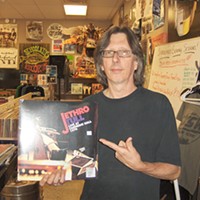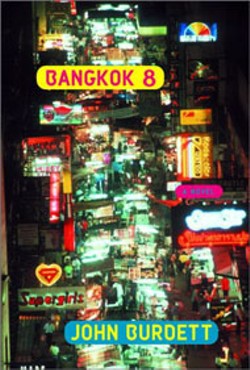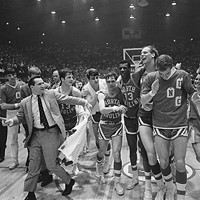"What's the matter," the agent asks, "you scared of guns?"
In this and scores of other deftly written, tragicomic scenes, Burdett meditates on the many differences that underlie East and West: food (exotic vs. bland) and sex ("the West tries to turn the act of sex into a religious experience," notes the detective, "when to us it is no more than scratching an itch"); police work (deduction vs. intuition) and corruption (open graft vs. hypocrisy); and philosophies of life ("No one escapes their own culture," the detective says. "A consumer society is a consumer society. It may start with washing machines and air conditioning, but sooner or later we consume each other. It's happening to us too. But the Buddha taught freedom from appetite.").
Not surprisingly for a book steeped in Buddhist paradoxes and Eastern enigmas, the labyrinthine plot almost plays second fiddle to the eccentric personalities that people the story (the murder takes place on the first page, as though Burdett were saying, "Now that that's out of the way. . .").
Chief among them is the narrator, Sonchai Jitpleecheep, the half-caste offspring of a mysterious US serviceman and a world-class Thai bar girl. His multicultural background is more than a narrative device (though Burdett's previous novel, The Last Six Million Seconds, featured a Hong Kong detective of Chinese and Irish descent); it's a symbol of the clashing cultures at war all around -- and within -- Sonchai.
The dichotomies abound: he has a criminal past, enjoys the local drugs and has a weakness for fine clothes. But as a practicing Buddhist, he successfully battles the corrupting temptations of graft and flesh -- including the gorgeous form of the smitten FBI agent. He's educated in a Western sense -- he's fluent in English and French -- as well as an Eastern one, communicating regularly with his dead partner (killed investigating the marine's death) and seeing people's past lives as clearly as their current ones.
The other principals are as well-drawn as Sonchai. His ultra-pragmatic mother is coming out of retirement to open a Viagra-based niche bar after greasing the palms of her son's bosses. Sonchai's direct superior is the prototypically corrupt Third World official with unsavory CIA ties, who nevertheless grudgingly admires his charge's incorruptibility and serves as his protector. Even the sworn enemy of Sonchai -- by virtue of the vendetta for his partner's life -- is the Yin to Sonchai's Yang.
The Westerners are as fleshed out, but don't fare as well; this is the East, after all. The FBI agent is particularly frustrated by the Eastern mindset, especially since her agency background is based exclusively on deductive reasoning, and Sonchai appears to be the one man immune to her charms. The brother of the dead marine, a former drug kingpin in New York, doesn't have any more success adapting than the FBI agent, but can admit when he's whipped thanks to his street smarts. And the worldly jade exporter and Orientalist proves that he's the farthest of all from what the Buddha called "enlightenment."
By the end of the novel the case hasn't so much been solved as it has simply evolved into another state, posing as many questions as it answered. The only trial that takes place is the ongoing one where West and East collide. Soon, Burdett and his narrator suggest, one culture will emerge victorious: either the West will learn to adapt to life's illogical course and adopt the Eastern mindset of acceptance, or the East will be overrun by the West's need to control everything.
"To be frank, nothing has changed since The Quiet American," says the exporter, giving a nod to Graham Greene's seminal East-meets-West-East-regrets-it novel. "When we finally destroy the whole world it will be with the very best of intentions."
Latest in Books
More by John Schacht
-

Two Ex-'CL' Music Editors Put the Charlotte Scene Into Perspective
Apr 26, 2017 -

CD Review: Floating Action's Body Questions
Nov 12, 2014 -

CD review: Buellton's Silent Partner
Oct 1, 2014 - More »
Calendar
-
An Evening With Phil Rosenthal Of "Somebody Feed Phil" @ Knight Theater
-
Kountry Wayne: The King Of Hearts Tour @ Ovens Auditorium
-

NEW WINDOW GALLERY-Pat Rhea-ACRYLIC PAINTINGS-April 05-30 2024 VALDESE, NC 28690 @ New Window Gallery/Play It Again Records
- Through April 30, 12 p.m.
-

Trap & Paint + Karaoke @ Zodiac Bar & Grill
-

LIVE MUSIC FRIDAYS!!! @ Elizabeth Parlour Room
-
Holiday Gift Guide
26 ways to shop local this holiday season
-
Fall Guide: Upcoming festivals, comedy shows, visual arts events and more
-
Halo 4 earns critical hallelujahs
Plus, news on Mass Effect Trilogy, LEGO: The Lord of the Rings











